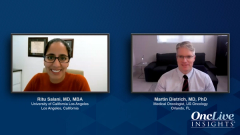
Expert Insights on HER2 Testing in Gynecological Cancers
Ritu Salani, MD, provides expert insights regarding HER2 testing in patients with gynecological cancers, emphasizing the need for standardization in testing practices and greater clarity surrounding the incidence of HER2 positivity across gynecological cancers.
Episodes in this series

Dr. Ritu Salani and Dr. Martin Dietrich discuss the importance of HER2 testing in gynecological cancers and how to prioritize different targets in clinical practice.
Dr. Salani believes that HER2 testing is becoming more common and can often be done at the institutional level. While not yet considered standard of care, she recommends testing for HER2 expression if possible, particularly in adenocarcinomas. Fresh tissue is preferred, but not always feasible.
For ovarian cancer patients, next-generation sequencing (NGS) is typically performed, and adding immunohistochemistry (IHC) testing for HER2 does not significantly increase the workload. Similarly, in endometrial cancer, immunohistochemistry, mismatch repair deficiency testing, and POLE testing are now part of the staging system, and NGS is common. Dr. Salani suggests that IHC testing for HER2 should be included in the standard service if it cannot be performed at the institution.
While the baseline HER2 expression and target patient population in gynecological cancers are yet to be fully understood, Dr. Salani believes that testing is worthwhile in all advanced or recurrent cases.
Dr. Dietrich notes that the impact of HER2 varies across different cancer sites, with favorable data in bladder cancer, where topoisomerase inhibitors are not commonly used. He suggests that the lack of prior exposure to topoisomerase inhibitors in gynecological cancers may contribute to the promising results seen with ADCs in these malignancies.
Both doctors express excitement about the expanding role of biomarkers and the potential for HER2-targeted therapies in gynecological cancers.
Summary generated by Claude AI.





































